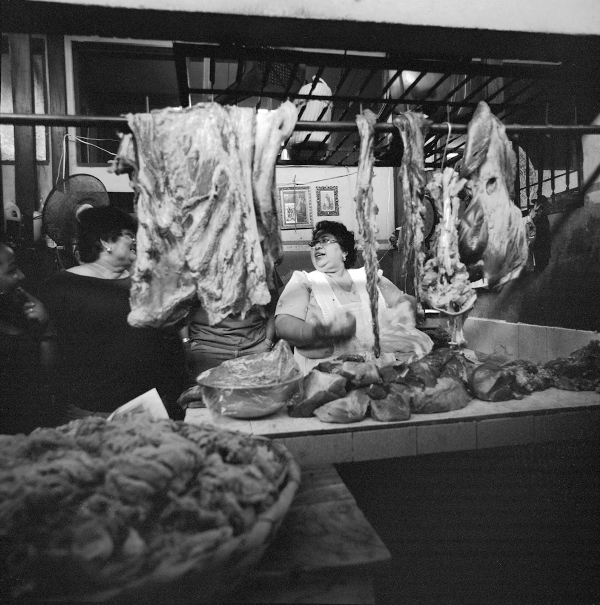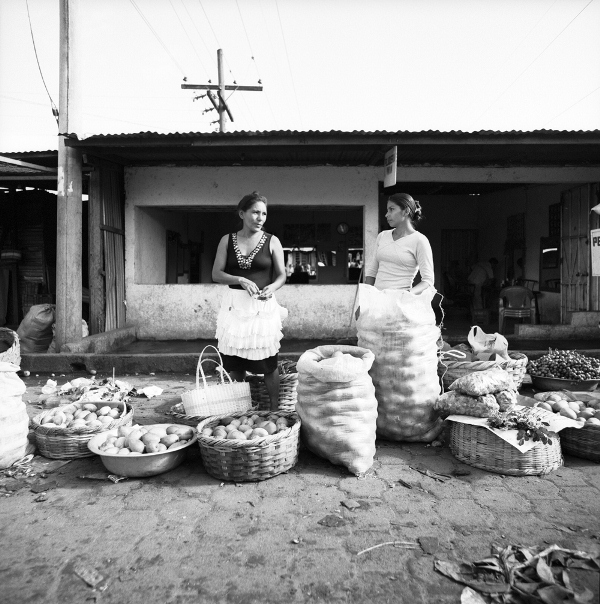Wok the Dog is a long-term photo-documentary of food markets around the world. The project began as an exploration of childhood fears. Clean, brightly lit supermarkets didn’t exist in Taipei in the early 80’s. The markets were dark, full of pungent smells; floors were slick with blood and water. At three feet tall, I was afraid of getting lost in the crowd, taken by the butcher, caged, and sold.

At 18, I returned to Taiwan and to the markets, wanting to see what had made me so afraid.
What was once fear turned into an examination of the commerce of life: the death of the animal sustains our lives and the livelihood of the vendors. I realized how purchasing packaged meats, “pink in plastic,” makes me forget about where food comes from.
There is an honesty in the lives of the vendors who have surrounded their days with death. The sanctity of death and the fragility of life are honored by experiencing both in the most fundamental way, day in and day out. Through the vernacular of food, markets and animals, we can discuss the larger issue.
Wok the Dog is about the cost of living.
The sterility of the 24-hour superstore renders us blind to the impact we make on the natural equilibrium with our food purchases. Convenience permits us to avoid our own mortality. Our detachment makes the food less special, and life less precious. We would not eat as we do, or waste as we do if we really understand what it takes to produce a six-ounce steak. Recognizing the truth enhances our humanity; the beastliness lies in our avoidance.
I’ve been photographing Wok the Dog in various parts of the world for 15 years now.
I love the road but what I love more is to travel for a specific project. When I travel with a purpose, I begin to filter each experience through the main objective and my purpose begins to dedicate and influence each and every one of my experiences. With it, the traveling becomes more focused, it takes on a different tonality and can be a grounding force when I feel like I am aimlessly roaming the world.
The first questions I ask at any hostel I check into are:
Where is the market?
and
What time does it start?
I start my next morning at the market, shooting, discovering and infiltrating local kitchens. I love the markets on my travels, as the market is never for the traveler or the tourist. Sure, there are markets where the tourists frequent but those tend to be handicraft markets and not bloody meat markets. The market is created by the locals, for the locals. It is a view of the local economy and its culinary culture at its best.

When you hit upon a town right before a high holiday or during market day, it comes alive with vividness like nothing you’ve ever seen. It is one of the most authentic and rewarding travel experiences. Often you will find many delicious and inexpensive treats at the market and, at the very least, you will be able to pick up fruits and vegetables to compliment your meals.
When you travel for a particular project or a purpose, you will go out of your way to ask questions and find opportunities to complete the project. You will make a greater effort to meet the locals, leave your guide book behind and be open to one of a kind experiences. Traveling with a purpose can bring focus to your trip and add new skill sets to your career break resume – for example:
“I spearheaded negotiations with tribal chief and facilitated a young couple’s marriage with the chief’s blessing and a roast goat for the whole village.”
Charlie Grosso has yet to kiss a pirate or climb Mt Kilimanjaro, but she has traveled to many faraway places and logged more hours on buses, trains and boats than she cares to admit. You can follow her adventures at SpyTravelogue or see more of her photography at Wok The Dog.
Charlie’s next adventure is the Mongol Rally, driving from London to Mongolia this summer to raise money for the Lotus Children’s Centre in Ulan Bator, Mongolia.






